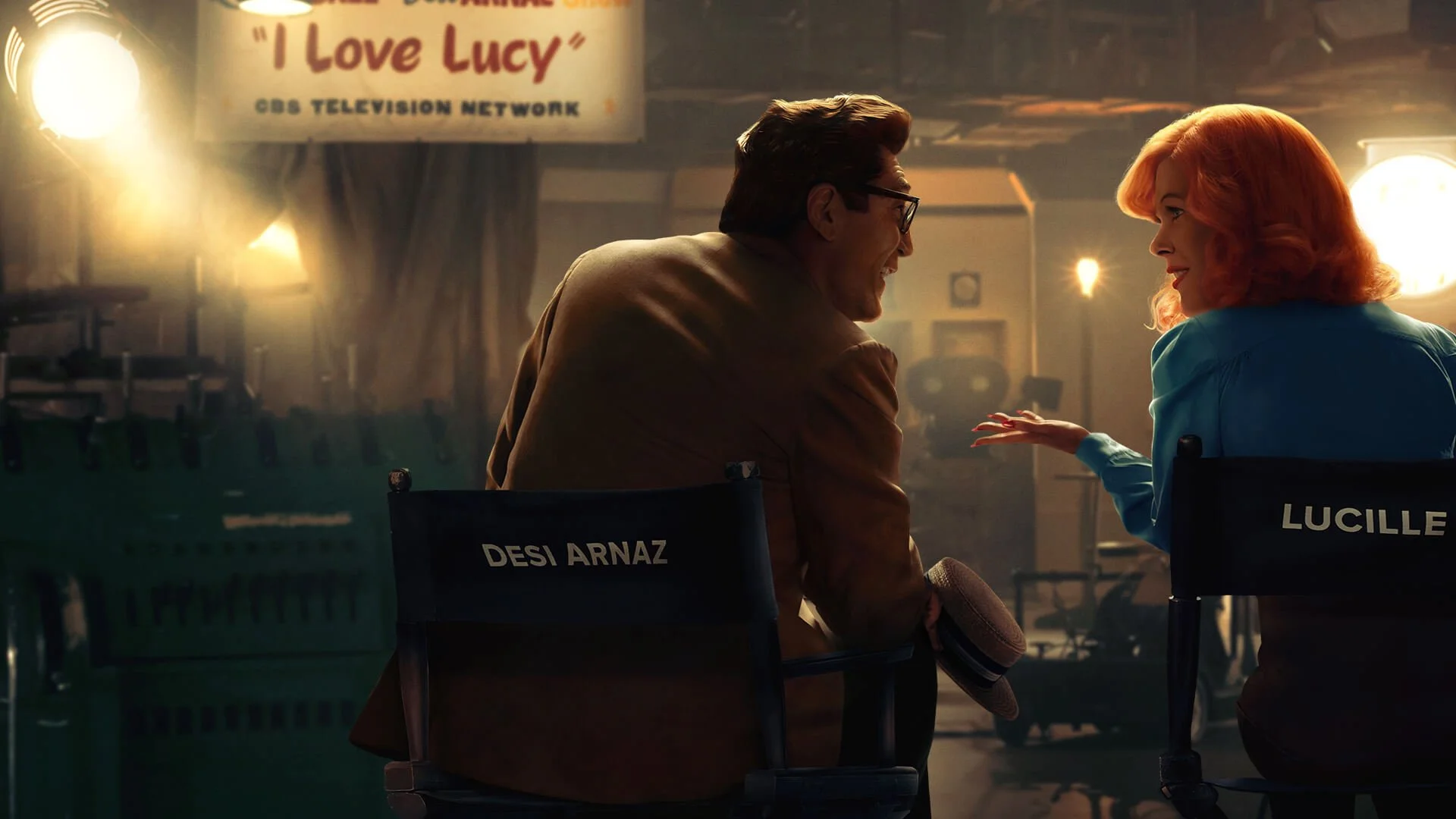“I Love Lucy” (1951 – 1957) graced millions of American households for six seasons during the (first) Golden Age of Television, and Lucille Ball and Desi Arnaz’s hilarious sitcom made them stars. Nicole Kidman and Javier Bardem are two of today’s brightest movie stars, and they play Lucille and Desi, respectively, in writer/director Aaron Sorkin’s “Being the Ricardos”, a film set during one week of planning for an “I Love Lucy” episode, although most of this movie’s dramatics unfold behind the cameras.
The Phoenix Film Festival was invited to a “Being the Ricardos” virtual press conference with Kidman, Bardem, and their co-stars J.K. Simmons and Nina Arianda, who are William Frawley and Vivian Vance (a.k.a. Fred and Ethel Mertz) in the film. The Phoenix Film Festival’s questions weren’t chosen, but we were thrilled to attend the event!
“Being the Ricardos” arrives in theatres on Fri., Dec. 10 and on Amazon Prime Video on Fri., Dec. 21.
Q: Javier, I love that this movie is not just about Lucille and Desi as business partners, trailblazing business partners, but also as a married couple dealing with stuff. How did those different aspects of their relationship appeal to you?
JB: Well, that’s the complexity of the script. It really goes to different places without abandoning (anyone) specific. It (has) lots of aspects of them as a couple, as artists, as colleagues, and everything is so well put together that it makes it more exciting to perform it and watch it. It’s full of details to give you a good idea of who they were and what they were doing.
Q: Nicole Kidman, I always wondered why there wasn’t a movie made about Lucille Ball. Look, she was a studio head at the time when there weren’t that many women running a studio.
NK: None.
Q: None. Exactly!
NK: Well, she wasn’t running a studio, but they had Desilu Productions. No actors had that at that time. She was the first of her kind. She was one of a kind. This film pulls the curtain back. It’s not the “I Love Lucy” show. It’s how it was made and who was this person that was capable of that genius. What was her story? What was her life? Aaron Sorkin compresses a number of things into a week and, flashing forward and back, (shows) the essence of who this woman was and who these people were. When I was sent (the screenplay), I couldn’t put it down. (It’s) extraordinary. I will ask anyone to read the screenplay because it’s such a good read.
Q: You are all giving two performances in this movie. You’re playing the characters you’re playing, and then you’re playing the characters that they play on the show. Nina, how did you approach that?
NA: For me, it was really important to honor the physical differences between the two women because they were so extreme. Vivian was a wonderful dancer. She was a leading lady. She was an ingenue, and Ethel was Ethel. (I had) all of the research I could possibly want for Ethel, but for Vivian, it was a little tougher. A producer sent me a clip that was a couple of seconds long, and it was simply Desi introducing Vivian Vance to the audience right before they were taping. It was really eye-opening for me. Out came this woman with a long spine, her shoulders back, and she sashayed and took a graceful bow and left. I just saw a completely different woman. I became so obsessed with her background. For me, I was really trying to be as respectful as I could to these very different bodies.
Q: How about for you, J.K.?
JKS: As Nina said, we all had plenty of “I Love Lucy” to watch, so for those few moments when we were expected to sort of mimic the aspects of the show itself - the play within the play - that was very clear. About Bill Frawley, there was zero video that I could find outside of his films and his appearances on “I Love Lucy”. No talk shows, (nothing) on video, and not even a book. Desi famously wrote a book called “A Book”. There were plenty of books about Lucille Ball and even about Vivian Vance. Much less about Bill Frawley.
All of my research was (done) through the perspectives of Vivian, Lucille, Desi, Jess Oppenheimer, and some audio interviews. In a way, I found that to be – sort of – freeing, in terms of how I portrayed off-camera Bill, which is 98 percent of the movie. He was, honestly, not all that dissimilar from the cranky landlord Fred Mertz, but - the gift that we all got from Aaron Sorkin in this script and his direction along the way - there were so many beautifully detailed layers for all of us.
We got to see multiple aspects of these characters as they relate to each other at different times. The scene at the bar that I have with Lucille. The scene after the table read that I have with Desi. The back and forth that Vivian and Bill have. It was not easy, but it was clear how to lift that off the page.
Q: Javier, what struck you the most when you researched Desi Arnaz? What were your entry points to play Desi?
JB: His absolute confidence in himself and how supportive he was of his wife and the whole show. How he overcame obstacles with his strong sense of humor. That doesn’t mean that he didn’t take (the work) seriously, but he didn’t get stuck in the drama of it all.
Q: Nicole, in terms of preparation to play Lucille Ball, it’s more than just preparation. It’s a responsibility of sorts.
NK: Initially, when I said, “Yes”, I did not realize what I was saying “yes” too. I (said) “yes” to an Aaron Sorkin script and a great opportunity. I was like, “Wow!” It was (during) a pandemic. It was an extraordinary thing to sit on a Zoom (call) with Aaron, and (he said), “I want you to play Lucille Ball.”
Maybe, a week later, it hit me. I was trying to work on baby steps into her voice, and it was nowhere within reach. I (thought), “Oh no. What have I done? I wish I had the talent to do this, but I don’t.”
Luckily, I had a couple of months (to) work on it slowly, meticulously, methodically, watching the show, listening to the voice, and doing all of the preparation, which is very unusual for me. A lot of times, I’ll start really inside, but the inside of it was already there, just because I could relate to her. I could feel her. (The script) was so beautifully written.
Then, I (thought), “How do I actually create Lucille Ball?”
Aaron was fantastic. When I freaked out, which I did, he sent an email that basically (said), “You’ve got this. You’re just going to have to take it day by day. I don’t want an impersonation. I want you to do the work that you can do…that I know you will do. I (don’t) want you to freak out because I believe you can do it.”
I would challenge him on that at different points, and he would never waver. He was so consistent in his belief. I would be begging for some sort of nose or chin, and he’d say, “I don’t care.”
It was frustrating for him, I think, because he saw how he wanted it. It took me time to give over to that. In the process, I was able to work on the actual Lucy part of it. I could hang my hat on that. I’d (think), “I’m going to have the hair. I’m going to have the lips, and I’m going to have all of that.” Even though (playing Lucy on the show) is a sliver of the movie, I’ll have that. Then, out of Lucy Ricardo came Lucille Ball. Lucille Ball is very different (than) Lucy Ricardo. Lucille Ball created Lucy Ricardo.











